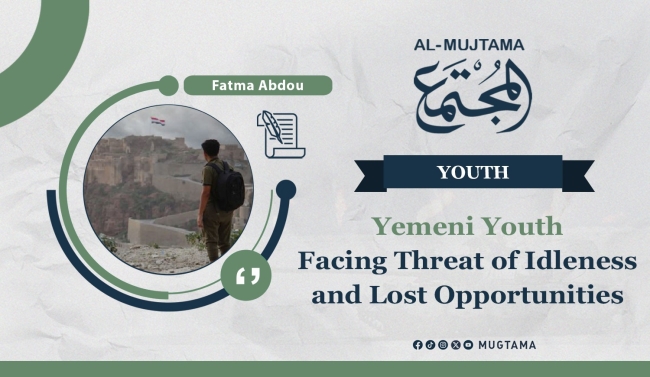Yemeni Youth Facing Threat of Idleness and Lost Opportunities
Arab youth in general face a challenging void, but the Yemeni case is uniquely severe due to the ongoing war since 2015. This war has led to the closure of many sports and cultural clubs, the suspension of recreational activities, and a sharp rise in unemployment. Consequently, many young Yemenis spend their time chewing khat, wandering the streets, or even joining combat fronts, increasing the risks of deviation, crime, and societal instability.
Young people in Yemen face monumental challenges due to this void. With youth making up 70% of the country’s population, statistics reveal that one-third of them are unemployed, creating a crisis that fuels feelings of frustration and despair.
This void often translates into negative behaviors that threaten societal stability, such as deviation, crime, extremism, and terrorism. It also weighs heavily on their mental health and hinders their ambition, leading to disorders like depression and anxiety.
A 2019 study on mental health in Yemen revealed alarming statistics:
- Post-traumatic stress disorder (PTSD) affects 45% of Yemeni youth.
- Depression affects 27%, anxiety 25%, schizophrenia 18%, and phobias 4%.
The Trap of Idleness: Breeding Ground for Deviance, Crime, and Mental Illness
Social studies agree that the phenomenon of idleness among Yemeni youth is not just a fleeting issue but a trap leading to deviance, crime, and mental illnesses, threatening their future and that of their society. Idleness provides a fertile ground for deviant behaviors. Youth deprived of positive activities may resort to prohibited behaviors such as drug abuse, theft, assault, and moral corruption, jeopardizing societal cohesion.
Additionally, frustration and despair stemming from unemployment can push youth toward crime as a source of income or as a means of expressing anger. The void also serves as fertile soil for extremist ideologies. Young people lacking proper religious upbringing may fall prey to extremists who exploit their emotions and misguide them, potentially leading them to violent acts that threaten societal security.
Studies also highlight idleness as a major factor contributing to mental illnesses like depression and anxiety. Feelings of boredom, loneliness, and hopelessness negatively impact mental health, potentially leading to destructive behaviors, including suicide.
Thus, the negative effects of idleness overshadow all aspects of young people's lives, from their mental health to their social behavior, hindering their progress toward success and development.
Mental Health Crisis in Yemen
According to reports by the UN Population Fund (UNFPA) last year, Yemen suffers from a severe shortage of mental health services and resources:
- Seven million Yemenis required mental health care in 2024.
- There is only one psychiatrist for every 700,000 people, compared to the global standard of 40 psychiatrists per 100,000 people.
- Only 120,000 out of the seven million in need can access mental health services.
- At least one-third of Yemenis suffer from mental disorders.
Suicide Cases
UNFPA statistics also highlight an alarming spread of suicide cases in Yemen:
- More than 50 suicides or suicide attempts occurred in Houthi-controlled provinces in 2022.
- One suicide case every two days.
- Over five teachers committed suicide in Ibb Province in 2019.
These statistics emphasize the dire impact of Yemen's civil war and the void and unemployment among Yemeni youth, alongside the accompanying psychological and behavioral effects that threaten societal stability and future.
The Void and Youth Suffering
The war has caused the closure of many sports and cultural clubs, depriving youth of sports and activities that once filled their time positively.
Recreational activities such as cultural events, trips, and outings have also ceased, intensifying feelings of boredom and frustration.
The conflict has significantly increased unemployment rates, making it challenging for young people to find jobs that could productively occupy their time.
Almost all sports activities in Yemen have halted during the war, including leagues, football matches, and other games. For years, Yemen did not participate in any regional or international sports activities sine the eruption of war. The 2019–2020 season marked the first football league since sports activities stopped in 2014, following the Houthi takeover of Sana’a and the start of the war.
Undoubtedly, the suspension of sports activities since 2014 has had a profound impact on clubs and athletes, depriving them of training and match opportunities, leading to a decline in the country's sports standards.
Youth and Social Media
The misuse of social media, without ethical or value-based guidance, has led to a significant waste of time, the most precious human resource. Many young people have become mere consumers, neither benefiting themselves nor contributing to society.
A large segment of youth has retreated into isolation with these platforms, distancing themselves from societal issues. This detachment prevents them from engaging in the pressing issues of their community, depriving Yemen of a vital force in addressing its crises.
One specialized study noted that about 70% of Yemeni youth spend most of their time on social media, with no tangible benefits for themselves or society.
Another study found that social media addiction has significantly altered societal behaviors among Yemeni youth. Traditions like visiting during occasions and cooperating in crises have dwindled, as many youth don’t care anymore of crises and disasters even affecting their relatives. Many now content to send text messages as their maximum form of participation.
The increasing free time among Yemeni youth is closely tied to the country's economic crises and the widespread tribal conflicts. Finding effective solutions is impossible without addressing the civil and tribal disputes that act as the root cause, as these conflicts exacerbate unemployment, crime, drug abuse, and, most critically, the erosion of values and religious principles among many young people.
-------------------------------------------------------------


